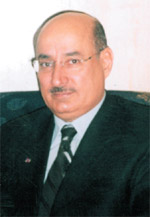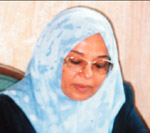
Dr. Abdulaziz Othman Altwaijri “We are here to develop the bilateral relations in Education, Science and Culture and to create new fields of joint work” [Archives:2001/26/Interview]
June 25 2001

After becoming Deputy Director General for Culture, ISESCO in 85, he was elected as Director General in 1991, and reelected for the second time in the post in 1997. He is also Secretary General of the Federation of the Universities of the Islamic World.
Dr. Altwaijri visited Yemen in an official five-day trip this month in order to organize and participate in a conference regarding education, science and cultural issues, and to discuss bilateral relations between Yemen and the ISESCO. Nadia Al-Saqqaf met with him and filed this interview.
Q: What was the purpose of your visit and how much have you achieved so far?
A: Our 5-day visit is a response to the invitation we received from the Minister of Higher education to develop the bilateral relations in Education, Science and Culture and to create new fields of joint work. We are here to assist Yemen to cope up with the development taking place in the three fields mentioned. I met with Minister of Education, Information, Culture, Higher Education, Experts and Minister of Human Rights. I also met with the Prime Minister and have an appointment with the President today.
Q: How do you describe the mission of ISESCO?
A: The Islamic Educational, Scientific and Cultural Organization was set up after the adoption of its statute by the Eleventh Islamic Conference of Foreign Ministers, meeting in Islamabad, Islamic Republic of Pakistan, in May 1980. The third Islamic Summit Conference, held in Makkah Al-Mukarama and Taef , Kingdom of Saudi Arabia, decided in January 1981 to set up the Islamic organization. The first conference of ISESCO was then held in Fez, Kingdom of Morocco may 1982. There are 46 member states of the organization and it cooperate with international and regional organizations and institutions such as UNO, OIC, UNESCO, WHO, WIPO, UNDP, IEU, AFEDA, and many others. We have 106 cooperation agreements with Islamic, international and regional organizations.
There are seven main objectives of the organization:
– To strengthen and promote cooperation among the member states, and consolidate it in the fields of education, science, culture and communication.
– To develop applied sciences and use of advanced technology within the framework of the lofty and perennial Islamic Values and Ideals;
– To consolidate understanding among Muslim people and to contribute to the achievements of work culture and security in the fields of means, particularly through education, science, culture and communication.
-To achieve complementarity and to seek to achieve coordination among the specialized institutions of the organization of the Islamic conference in the fields of education, Science, Culture and communication. And among the members states of the ISSESCO in order to consolidate Islamic solidarity.
-To make Islamic culture, the basis of educational curricula at all levels and stages.
-To consolidate Islamic culture, protect the independence of Islamic thought against invasion and historical factors and safeguard the features and distinct characteristics of the Islamic civilization.
– To safeguard the Islamic identity of the Muslims in non-Islamic countries.
Q: To what extent can you say ISESCO is successful?
A: We are very successful and we achieved many things. On the level of the prospective strategic planning for and educational, scientific and cultural resurgence of the Islamic world, ISESCO laid down four majors strategies which constitute the strategy of knowledge from an Islamic view point, namely:
Strategy for the promotion of education in Islamic countries, cultural strategy for the Islamic world, strategy of the development of science and technology in Islamic countries and strategy for Islamic cultural action in the west. The Islamic organization is presently working on a draft strategy for bringing Muslim Madhahibs.
There are major civilizational projects and there are programs and projects executed in cooperation with international and regional organizations. Since its establishment in 1982 up to the end of the year 2000 ISESCO has implemented 463 training sessions, workshops, specialized meetings, and has published 345 books and studies among the many other achievements.
Q: what are the main broad out lines of the current ISESCO action plan?
A: The current three year action plan for the years 2001- 2003 contains 187 programs and 11 major civilizational projects in education ( illiteracy eradication, education in the service of sustainable development, Arabic language training centers in non-Arabic member states ..etc.), science ( research of scientific and technological development and its applications, natural resources and development, social and human science ..etc), culture and communication (Islamic culture identity, active and interactive Islamic culture, communication capacities of the Islamic countries ..etc.), external relations and Cooperations (development of educational, scientific, cultural and social institutions in al Quds Al Shareef, in Sarajevo, Arab Islamic and international cooperation ..etc.), and information and documentation ( information and communication for the development of the Islamic world, capacitates of the Islamic world to master knowledge for development, creation of a center for strategic studies for the Muslim world .etc.)
Q: What kind of problems does ISESCO face and how do you think they could be solved?
A: There are two basic problems we face: finance and slow response of member states. We receive our financing from the member states themselves. However, if we had more income we would have been able to achieve much more. As for the response of the member states, it is due to the routine and the bureaucracy of the systems. However, we tried to motivate our representatives in the member states to work on speeding up the procedures. We hope things will change for the better.
There is also another obstacle, which we face; it is the huge conflict between our policies and strategies and those of the Islamists. However, we have always made efforts to reach conciliatory agreements in order not to lose any side, because the spirit of Islam is moderation, peace and kindness.
Q: What does ISESCO do for woman?
A: Development of women is essential for the development of the society, for she represents half of the society and she is the essence of the success and happiness of any family. In all our programs we have focused on women. In fact in our current action plan we have a program for productive woman. Also the sole meaning of Islam is equality with no extremes. We aspire to reach these ideals of Islam through our efforts.

“My post requires hard and continuous work to strengthen, and improve Yemen’s relations with the ISESCO “Permanent representative of Yemen to ISESCO Mrs. Khadigah Radman told Yemen Times that her post requires hard and continuous work to strengthen, and improve Yemen’s relations with the ISESCO. It involves communication with several organizations such as Women’s National Committee (WNC) and providing reports and references as well as advice to it. It also requires direct participation in the conferences and projects which the Islamic organization conducts as she represents Yemen there.
She has been with ISESCO since July 2000, during all this time she has displayed excellent communication skills in cooperation with Yemen’s embassy in the Kingdom of Morocco.
“In my work, I make it a point that Yemen gets programs in all educational, cultural and scientific fields and in the field of communication and the support of the national committees. We are organizing three regional meetings supported by the organization:
1-A meeting for the specialists to plan education for the needy group, from 9 to13 June.
2-A meeting for young girls for their edification, the health and the gender education in next July.
3-A regional meeting in cooperation with the organization of UNESCO and the ISESCO, regarding the use of micro-science bags and the special guide of micro-experiences prepared by the UNESCO in their meeting in March 2000 Yemen will be financed for having a number of small laboratories to be set up in the needy schools.
——
[archive-e:26-v:2001-y:2001-d:2001-06-25-p:./2001/iss26/intrview.htm]


